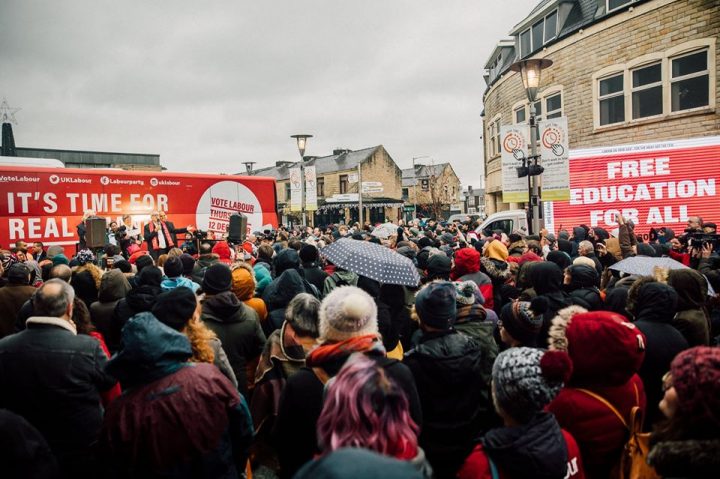The result of the UK elections was a hard blow to me for various reasons. Despite the negative forecasts and polls, I continued to hope, perhaps naively, for a victory of Jeremy Corbyn until the very end, because it would have been a breakthrough not only for the country, but also internationally, marking a radical shift in issues such as disarmament, environment and migration and putting an end to decades of austerity.
That’s perhaps why the right and the media have done everything to prevent it, taking to even more ferocious levels the campaign of denigration, lies and slander against the Labour leader. But above all Boris Johnson has been able to support the current tendency to vote (when voting) in a visceral manner, without reasoning and logical reflections, but pursuing easy solutions generally linked to the search for a scapegoat. In this way everything is being resolved in an irrational catharsis, blaming those who are worse off while hoping to improve one’s proper conditions of life.
In fact, what struck me most about the British elections was that poor people who complain about the disastrous state of National Health Service vote for those who destroyed it and not for those who propose to tax the rich to finance it. These people fall into the trap of blaming all evils on Europe and immigrants, reacting like a child exasperated by hives and ready to do anything to remove the itch. Johnson and the media obsessively talked only about Brexit and then presented the Conservative vote as the way to get the problem out of the way. “Get Brexit done! – Let’s get it over with Brexit!”, as if leaving Europe would magically resolve all the evils of the country.
The Labour programme contained proposals on health, education, housing and environment, which, taken one by one, enjoyed great popularity and had attracted and fascinated thousands of activists, especially young people. Corbyn has tried in every way to shift the debate from Brexit to social issues and particularly in recent days identified the vote for Labour with the defence of the National Health Service, a subject that affects the lives of all (except perhaps the few rich who can afford expensive private clinics). Even this seemingly simple message failed to get through to an electorate preferring the illusion that by moving out of Europe and driving off immigrants, things would get better.
Labour will have to reflect seriously on the reasons for this defeat after years of conservative government, but without falling into a trap that we know well in Italy: attributing defeat to an exceedingly radical program, and indicating as a solution more moderate choices that in fact represent only a sweetened version of the neo-liberal brutality of the extreme right.
We must also remember that the vote in the United Kingdom reflects a general tendency to vote for “strong” men like Trump, Bolsonaro and Salvini, privileged men who present themselves as saviours and direct the anger of people for the ever worsening living conditions towards the weakest and most discriminated members of society.
How do we get out of it? Looking for a spark of hope in this dark moment I have tried to identify a common element in the more positive and encouraging phenomena of recent times and found it in a word that summarizes an apparently basic feeling, but which in reality is profound: Enough! The American students who are fed up with school massacres, which last year gave rise to marches and initiatives against the arms lobby, are saying enough. Greta and the activists of Fridays for Future and Extinction Rebellion, who reject a future marked by climate catastrophe, say it’s enough. Chileans who claim dignity and justice after years of disastrous neo-liberal policies are saying enough. Me too feminists, the Non una di meno (Not one less) movement and the flash mob against the violence of the patriarchal, oppressive and rapist state that has travelled around the world, say it’s enough. Individuals, associations and NGOs that defend the rights of migrants and save lives at sea and on land, rejecting the false rhetoric of invasion, are saying enough. The Italian Sardines movement, who took to the streets to refuse political speeches of hate, racism and fascism, also said it was enough. And there are many more…
All these movements, however, not only represent a denunciation, but also provide a channel of expression to a need and a feeling of union, love, hope, solidarity and community. They are creative, spontaneous and horizontal and correspond to a new sensitivity that is expanding especially among young people, but that also knows how to recover and enhance the most inspiring moments of the past. Young Chileans who were not yet born at the time of Pinochet’s coup d’état and now sing with enthusiasm El pueblo unido jamas serà vencido are a clear demonstration of this bridge between generations.
So maybe this is the way we need to explore and deepen: a feeling that resonates in the hearts of many people, that welcomes and values diversity, giving hope and opening the future beyond failures and defeats unavoidable in this moment in which a still fragile and fragmented new world tries to make its way in a violent world that resorts to every means to preserve its power.
Translation from Italian by Thomas Schmid






